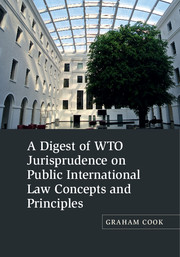Book contents
- Frontmatter
- Contents
- Foreword
- Disclaimer
- Acknowledgments
- Preface
- Editorial conventions
- Glossary of commonly used terms
- Table of GATT/WTO cases
- 1 Admissibility and jurisdiction
- 2 Attribution of conduct
- 3 Breach of an obligation
- 4 Conflicts between treaties
- 5 Countermeasures
- 6 Due process
- 7 Evidence before international tribunals
- 8 Good faith
- 9 Judicial economy
- 10 Municipal law
- 11 Non-retroactivity
- 12 Reasonableness
- 13 Sources of international law
- 14 Sovereignty
- 15 Treaty interpretation
- 16 Words and phrases considered
- Index
12 - Reasonableness
Published online by Cambridge University Press: 05 July 2015
- Frontmatter
- Contents
- Foreword
- Disclaimer
- Acknowledgments
- Preface
- Editorial conventions
- Glossary of commonly used terms
- Table of GATT/WTO cases
- 1 Admissibility and jurisdiction
- 2 Attribution of conduct
- 3 Breach of an obligation
- 4 Conflicts between treaties
- 5 Countermeasures
- 6 Due process
- 7 Evidence before international tribunals
- 8 Good faith
- 9 Judicial economy
- 10 Municipal law
- 11 Non-retroactivity
- 12 Reasonableness
- 13 Sources of international law
- 14 Sovereignty
- 15 Treaty interpretation
- 16 Words and phrases considered
- Index
Summary
Introduction
The concept of reasonableness is ‘present in many of international law's primary rules, across a wide range of subject areas’, including international human rights law, the law of the sea, and international environmental law. In the Barcelona Traction Case, the ICJ held that ‘it is necessary that the law be applied reasonably’ in the field of diplomatic protection ‘as in all other fields of international law’. The term ‘reasonable’ appears more than 200 times in the WTO agreements, and there are more than 8,000 references to this term (and its variants) in WTO decisions. This chapter reviews WTO jurisprudence relating to the three different aspects of reasonableness as a legal standard: (i) the meaning of the term ‘reasonable’ in various provisions of the WTO agreements; (ii) reasonableness as an unwritten legal test in different contexts; and (iii) reasonableness in treaty interpretation.
The meaning of the term ‘reasonable’
12.2.1 Reasonable administration of laws
WTO panels and the Appellate Body have been called upon to interpret and apply the term ‘reasonable’ in the context of Article X:3(a) of the GATT, which provides that WTO Members ‘shall administer in a uniform, impartial and reasonable manner all its laws, regulations, decisions and rulings’.
In US – COOL, a dispute involving a claim under Article X:3(a), the Panel stated:
The term ‘reasonable’ is defined as ‘in accordance with reason’, ‘not irrational or absurd’, ‘proportionate’, ‘sensible’, and ‘within the limits of reason, not greatly less or more than might be thought likely or appropriate’. We assess the parties' claims of not reasonable administration in light of these definitions.
In our view, whether an act of administration can be considered reasonable within the meaning of Article X:3(a) entails a consideration of factual circumstances specific to each case. This is confirmed by previous disputes where the requirement of reasonable administration was understood as requiring the examination of the features of the administrative act at issue in the light of its objective, cause or the rationale behind it.
- Type
- Chapter
- Information
- Publisher: Cambridge University PressPrint publication year: 2015

